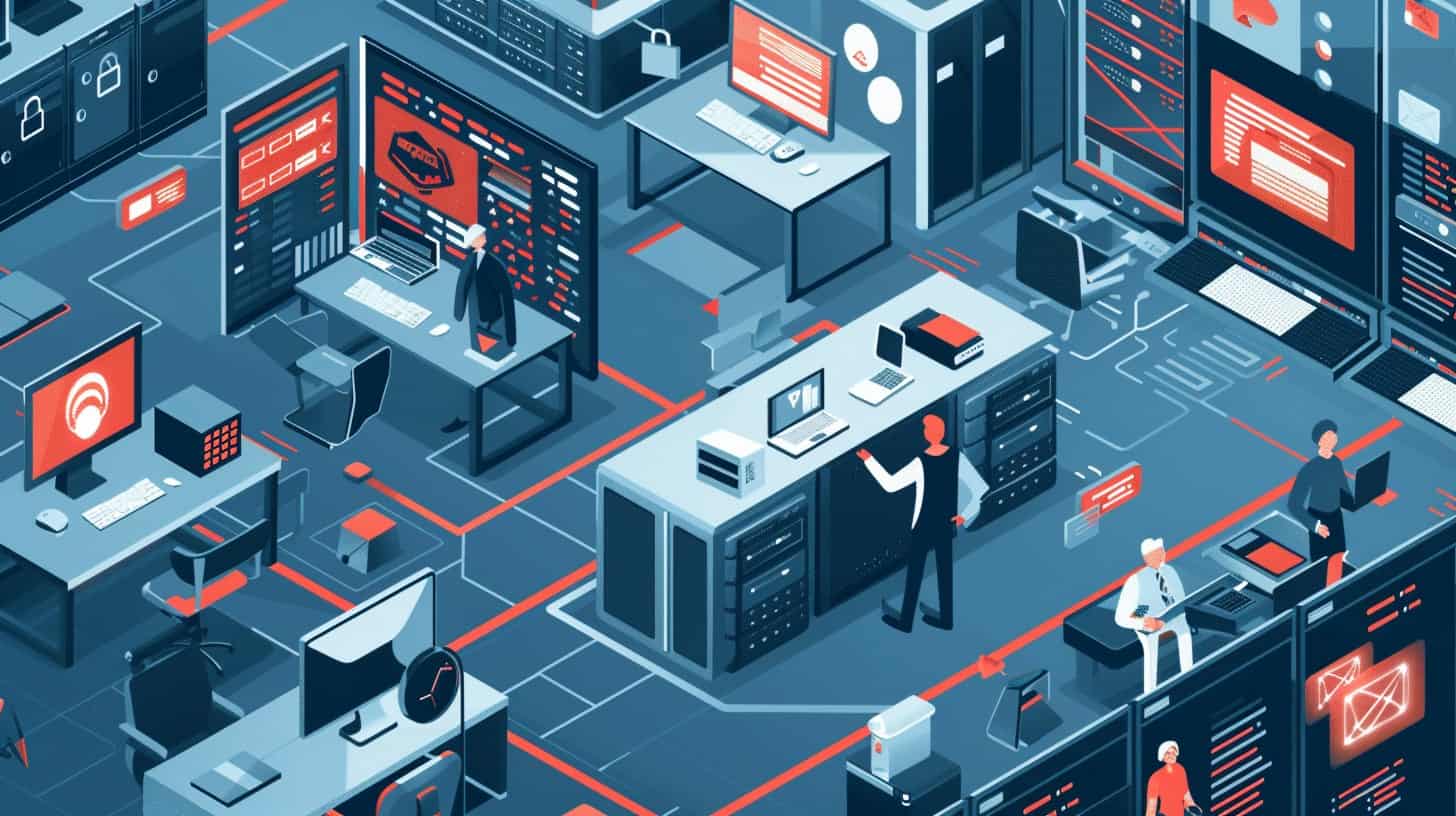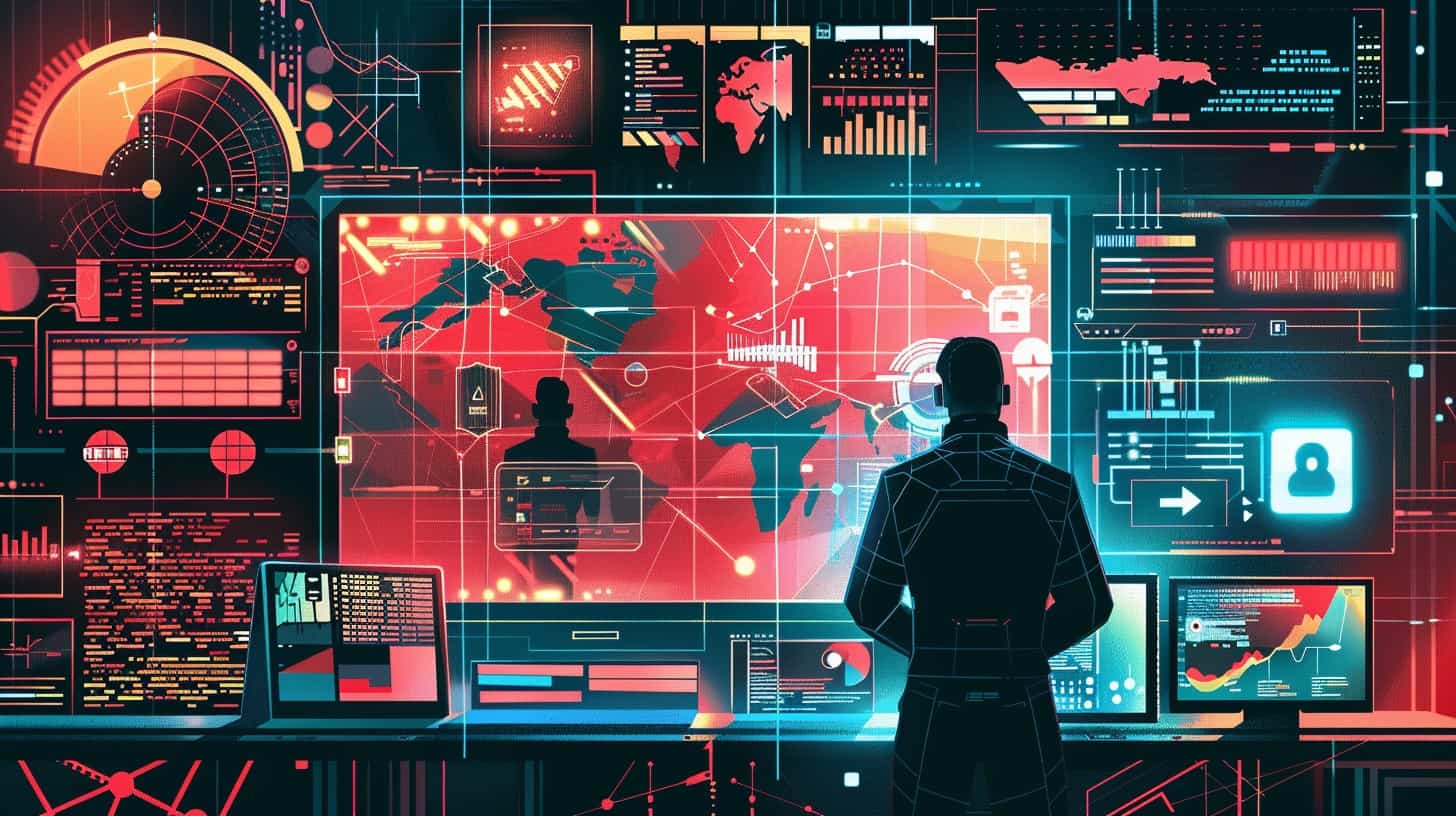Cybersecurity might be hard, but understanding residual risk is crucial for protecting your business. Residual risk refers to the threats that remain even after implementing security controls. 3 Recognizing these risks can help you avoid potential cyber-attacks and safeguard critical information.
As cybersecurity professionals with extensive experience in risk management and information security, we know how vital it is to balance inherent and residual risks. 1 Our insights will guide you through strategies to mitigate these dangers effectively.
Read on—we’ve got essential tips for keeping your business safe from persistent cyber threats.
Key Takeaways
Residual Risk Explained: Residual risk is the danger that remains even after implementing security measures. For example, using firewalls does not eliminate all cyber threats.
Difference Between Inherent and Residual Risks: Inherent risk exists before any protective measures are taken. Residual risks exist despite those measures, like a locked door still at risk of being picked.
Common Myths Dispelled: Mitigating residual risks doesn’t mean achieving zero risks; some level of threat always persists. Regular assessment is key to managing these ongoing threats effectively.
Mitigation Strategies: Important tactics include regular cyber audits, penetration testing, and updating security controls like antivirus software and encryption to manage residual risks effectively.
Advanced Tools for Management: Software such as Reciprocity ROAR uses AI to monitor and analyze cybersecurity threats in real-time, helping businesses stay ahead of evolving risks.
Table of Contents
Understanding Residual Risk in Cyber Security

Residual risk is the danger that remains after taking all possible security measures. Even with strong defenses, some risks cannot be completely eliminated.
Inherent Risk vs. Residual Risk
Inherent risk
is the amount of risk present before any controls or defenses are applied. So, if you have a website without firewalls or passwords, its inherent risk is high. 1 Think about leaving your house door open all night—anything could happen.
Residual risks are what remain after you’ve added security measures like anti-malware software and encryption. Even with these protections, some cyber threats persist. 2 It’s like locking your doors but knowing there’s still a small chance someone might pick the lock.
Understanding both types helps in creating an effective Cyber Risk Management Framework for better protection against cyber attacks and ensuring business continuity plans are robust.
Common Myths About Residual Risk
Residual risk often confuses people. Some think mitigating residual risk means achieving zero risk. In cyber security, that’s impossible. No organization ever gets 100% secure. Even top cybersecurity measures leave some risk behind. 3
Another myth is believing all risks can be controlled. Implementing controls reduces inherent risk, but never eliminates it fully. Residual risks remain even with the best defenses like malware detection and threat intelligence solutions in place. 4
Many also assume residual risks are acceptable by default once they implement certain controls or comply with regulations like ISO 27001. But regular assessment of these risks is crucial to manage evolving threats like the SolarWinds hack or Log4j vulnerabilities effectively.
Overall, combating residual myths helps businesses make informed choices about their cyber defenses and better prepare against potential breaches from advanced persistent threats such as APT29 and ransomware like Hive.
The Role of Residual Risk Management

Residual risk management helps protect your data and systems. It also guides how you run your business safely.
Its Impact on Information Security
Residual risk affects information security by exposing your business to threats even after taking cybersecurity measures. 4 Healthcare groups often face cyber and ransomware attacks, putting sensitive data at risk.
Electric utilities also deal with cyberattacks that can damage physical systems.
Cybercriminals are always finding new ways to attack, which means constant vigilance is needed. Companies need strong internal controls and regular monitoring to reduce these risks.
Compliance with regulations like GDPR is key for protecting customer data from breaches. 5
Its Influence on Business Strategy
Knowing the impact on information security helps drive a business’s strategy. Every company must manage residual risks to protect its reputation and assets. 3 Ignoring these risks can lead to breaches or failures, damaging both trust and financial health.
Effective risk management shapes business operations. Strategies include regular monitoring of cyber threats and allocating resources efficiently. Companies might use tools like Google Analytics for tracking data or apply enterprise risk management (ERM) models for a thorough assessment.
By addressing vulnerabilities in areas such as cloud applications or e-health systems, businesses stay competitive and secure. 6
Strategies for Residual Risk Mitigation

Identify risks in your business. Implement controls to reduce these risks.
Assessing and Identifying Residual Risks
Assessing and identifying residual risks is key in cyber security. Here are steps to help.
- Full Risk Assessment: Conduct a thorough risk assessment by subtracting risk control from inherent risk. This gives you the residual risk. 3
- Cyber Security Audits: Regularly perform audits to spot gaps and vulnerabilities.
- Penetration Testing: Simulate attacks to find weaknesses in your system.
- Attack Simulations: Carry out attack simulations to see where residual risks exist.
- Use Cyber Risk Monitoring Services: These services provide visibility into your system and help identify threats and vulnerabilities. 6
- Monitor Software Vulnerabilities: Look for issues like Log4Shell or the SolarWinds attack that exposed many businesses.
- Track Residual Risk Postures: Keep an eye on how risks evolve over time with regular reviews.
Effective steps like these ensure you can identify residual risks early, before they become bigger problems for your business’s information security strategy.
Implementing Mitigation Controls
Implementing mitigation controls is crucial for managing residual risks in cybersecurity. These controls can help avoid, reduce, transfer, or accept risks. 5
- Identify Risks: Determine potential risks by using tools like risk assessments and vulnerability scans. 6
- Avoid Risks: Eliminate risky activities or processes that cannot be secured adequately.
- Reduce Risks: Implement strong security measures—firewalls, encryption, and antivirus software—to lower the chance of threats.
- Transfer Risks: Use cyber insurance to shift some risk responsibilities to third parties.
- Accept Risks: Understand some risks are unavoidable; decide which ones are acceptable based on impact.
- Use ISO 27001 Standards: Regularly monitor residual risks to meet ISO 27001 compliance requirements.
- Automate Security: Employ security automation tools to streamline risk management tasks and handle large volumes of data efficiently.
- Regular Updates: Consistently update security measures to address new vulnerabilities and evolving cyber threats.
These steps ensure effective management of residual risks in your cybersecurity framework.
Regular Monitoring and Review of Risk Postures
Regular monitoring and review of risk postures are key in maintaining strong cybersecurity. They help ensure your system stays secure. 3
- Cyber Security Audits: Conduct regular audits. These identify gaps and vulnerabilities within your network.
- Penetration Testing: This involves simulating attacks. It helps uncover weaknesses before real attackers find them. 3
- Attack Simulations: Run these scenarios often. They test the readiness of your defenses against cyber threats.
- ISO 27001 Compliance: Regular reviews ensure compliance with ISO 27001 standards, a global benchmark for information security.
- Risk Monitoring Services: Use these services to maintain visibility into your systems continuously.
- Continuous Improvement: Make ongoing evaluations part of your processes to reduce risks over time.
- Identify Vulnerabilities: Consistent checks highlight areas needing improvement.
- Update Controls Regularly: Ensure mitigation controls stay effective by updating them based on findings from reviews.
Regular checks and updates make sure your cybersecurity measures remain robust and efficient, keeping threats at bay effectively. 5
Advanced Approaches to Residual Risk Management

Advanced approaches involve sophisticated tools and methods. They use ERM maturity models to enhance risk handling, and Reciprocity ROAR for better oversight.
Applying ERM Maturity Models
ERM (Enterprise Risk Management) maturity models use system dynamics to integrate risks. 7 The RIMS Risk Maturity Model identifies seven key qualities for effective risk management, ensuring a business operates with sustainable and repeatable processes.
ERM maturity assessment evaluates effectiveness in managing IT security and cyber risks. 4
Effective risk management is not a static process but an evolving practice, says the Chief Information Officer of many leading firms.
Companies apply these models to ensure their cybersecurity measures align with best practices. This keeps acceptable risk levels low while handling challenges related to compliance and regulatory standards.
Using Reciprocity ROAR in Risk Management
ERM Maturity Models
provide steps to improve risk management processes. Using Reciprocity, ROAR takes it further by integrating compliance and risk into one system. The tool gives a clear view of risks related to business actions.
This helps in making better decisions. 8
Reciprocity ROAR uses an AI engine to link business assets, processes, controls, and risks in real-time. This breakdown removes information silos and boosts efficiency. Businesses can track cybersecurity risks with precision through features like GRC software, aligning with companies’ goals for stronger security measures. 4
Addressing Control Gaps Effectively
Identify gaps in your security controls with regular audits. Use software tools like Reciprocity ROAR to assess risk. 4 Implement new measures to close these gaps immediately. Ensure you monitor changes constantly.
Focus on vulnerable areas, such as cloud-based services and third-party risk management. Follow National Institute of Standards and Technology guidelines. 5 Continuous monitoring helps detect new threats earlier, keeping your business safe from attacks like Clop ransomware.
Use AI for real-time threat detection. Data protection is key—control access strictly to sensitive information like Protected Health Information (PHI). Always follow regulatory compliance rules; they are there for a reason.
Overcoming Challenges in Residual Risk Management

Managing residual risks is tough—cyber threats keep changing, and resources are limited.
Read more to learn how you can stay ahead and protect your business.
Addressing the Changing Nature of Cyber Threats
Cyber threats evolve every day. New attack vectors, malware variants, and vulnerabilities emerge constantly. 9 These changes complicate the protection of critical infrastructures and business processes.
Dynamic threat landscapes lead to residual risk even after controls are in place.
Organizations need strategies to stay ahead. Regularly assess risks using tools like Bitsight’s ratings for security performance visibility. 9 Invest in cybersecurity training to reduce human error and update outdated infrastructure to lower risks. 6 Adapt quickly by prioritizing resource allocation based on evolving threats from hackers and threat actors—keep reviewing and updating mitigation controls frequently.
Prioritizing Resource Allocation
To manage residual risk, you must prioritize resource allocation. Assign weights to controls using a clear system. Leverage existing frameworks like NIST and ISO 27001. 11
Continuous risk monitoring helps allocate resources effectively. Focus on critical areas first—data protection, network security, compliance requirements. Use ERM maturity models to guide your strategy. 10
Managing Compliance and Regulatory Challenges
SEC rules require public firms to disclose cybersecurity measures
This keeps investors updated on risks. Ignoring third-party risk management (TPRM) is risky and can lead to data breaches.
Financial businesses in the EU must get ready for DORA regulations soon. Regular audits help ensure companies meet these standards, avoiding fines and penalties. Next, we will look at case studies on residual risk management. 12 5
Case Studies on Residual Risk Management

Some companies have successfully reduced their residual risks. Others faced failures and learned valuable lessons.
Successful Management of Residual Risk
Successful Management of Residual Risk involves several key steps. It ensures your business stays safe from cyber threats.
- Identify Residual Risks
- Use risk assessments to find possible threats.
- Gather qualitative data on each risk.
- Determine the level of inherent risk involved.
- Establish Mitigation Controls
- Implement access controls to protect data.
- Use firewalls and encryption as countermeasures.
- Ensure compliance with the General Data Protection Regulation (GDPR) standards.
- Regular Monitoring
- Conduct regular audits to check for new risks.
- Monitor performance metrics like bounce rate and unique visitors.
- Track changes in session cookies such as phpsessid and bcookie.
- Use Technological Tools
- Apply software for continuous risk assessment.
- Use AI and Machine Learning for advanced threat detection.
- Adopt Software as a Service (SaaS) solutions for better scalability.
- Address Control Gaps
- Identify gaps using tools like Reciprocity ROAR.
- Close gaps with additional security layers.
- Update internal processes regularly for enhanced protection.
- Learn from Case Studies
- Look at successful management examples in large corporations.
- Study failures to understand common pitfalls, especially in non-compliance cases.
- Engage Leadership
- Involve leadership in decision-making regarding cybersecurity policies.
- Get buy-in from top-level managers to allocate sufficient resources for infosec.
- Stay Updated on Cyber Threats
- Follow updates on emerging threats like Hive ransomware.
- Subscribe to industry newsletters like Risk Insiders for the latest information.
- Implement Enterprise Risk Management (ERM) Models
– Apply ERM maturity models to guide your strategy over time.
– Ensure that these models align with both business needs and regulatory requirements. - Utilize Predictive Analytics
– Use predictive analytics tools to forecast potential future risks accurately.
– Adjust strategies based on these forecasts to stay ahead of cybercriminals.
Concepts:
- CyberGRX
- ProcessUnity
- GDPR
Tools:
- Reciprocity ROAR
- SaaS solutions
Key Lessons from Residual Risk Management Failures
Residual risk management failures can teach us valuable lessons. Understanding these lessons can help protect your business in the future.
- Underestimating Nth Party Risks: Many businesses fail to consider risks from third-party vendors and their subcontractors. CyberGRX highlights this as a critical oversight.
- Ignoring GDPR Compliance: The Information Commissioner’s Office (ICO) enforces GDPR rules strictly. Non-compliance results in heavy fines and damages reputations.
- Lack of Regular Monitoring: Businesses often do not monitor risks regularly. This allows threats to evolve unnoticed, leading to breaches. 6
- Ineffective Anti-bribery Programs: Inadequate anti-bribery programs create internal vulnerabilities and uncover unethical practices within supply chains.
- Overlooking Technological Tools: Many companies don’t use advanced tools for risk assessment, missing out on AI and machine learning benefits.
- Poor Communication Channels: Ineffective communication among teams results in delayed responses to cyber threats, increasing potential damage.
- Inconsistent Risk Mitigation Practices: Inconsistent application of risk controls can leave gaps, exposing the organization to residual risks.
- Inadequate Training Programs: Employees remain a weak link when not properly trained, contributing to security breaches through phishing or social engineering attacks.
- Failure in Tracking Cookie Management: Poor handling of tracking cookies compromises user privacy, violating regulations and reducing customer trust.
- Resource Misallocation: Misprioritizing resources leaves critical assets unprotected, while less important aspects consume budget and attention.
- Neglecting ERM Maturity Models: Not applying Enterprise Risk Management (ERM) maturity models leads to inefficient risk strategies that don’t evolve with threats. 4
These lessons raise awareness about key vulnerabilities…
Technological Tools for Residual Risk Management

Use software to assess and manage risks. Leverage AI to spot potential threats.
Software for Risk Assessment and Management
Use specialized software to manage residual risk in cybersecurity. 5 Vendor security platforms help teams identify and assess risks. Examples include Reciprocity ROAR, which offers risk analysis tools tailored for businesses.
Software solutions often integrate with existing systems for seamless operation. They provide dashboards, data analytics, and automated alerts to keep you informed about potential threats.
Regular updates ensure the software stays effective against new cyber threats.
Advanced features like AI and machine learning enhance these tools further by predicting future risks based on historical data…making them indispensable in today’s digital economy. 6
To maximize productivity, adopt these 7 effective strategies…
Applying AI and Machine Learning to Identify Risks
AI and machine learning (ML) can identify cyber risks by analyzing large datasets quickly. They spot patterns that humans might miss, like unusual login times or strange data flows.
AI-driven tools scan millions of logs in seconds. 14
These technologies support TPRM professionals by evaluating third-party risks. They use algorithms to detect anomalies, flagging potential threats before they become problems. AI helps manage cyber threats effectively, enhancing risk assessments with precise, data-driven insights. 15
Future Directions in Residual Risk Management

Cybersecurity is changing fast. Predictive analytics helps foresee risks before they hit… it’s like a weather forecast but for cyber threats!
Machine learning will soon spot and fix weak points quicker than any human can, making systems safer and smarter.
The Role of Predictive Analytics in Forecasting Risk
Predictive analytics learns from data to predict future behavior for better decisions. 16 It uses statistics and techniques to predict future results based on past and current data.
For example, in supply chain management, these models can forecast demand spikes or shortages by analyzing previous trends.
In healthcare, predictive risk management solutions help spot potential outbreaks by examining patient records and environmental patterns. These solutions ensure businesses stay ahead of risks, allowing timely actions.
The process involves assessing risks—analyzing the root causes—and using AI for continuous monitoring and reporting. 17 This proactive approach enhances cybersecurity, reduces vulnerabilities like exploits and hacking attempts.
Evolving Cyber Security Risk Management Standards
New standards in cyber security risk management focus on countermeasures to handle threats better. Organizations now use systematic mapping reviews (SMR) to gather and analyze relevant information, which helps identify control gaps effectively. 18 Advanced tools like AI and machine learning aid in spotting risks early. Quantitative assessments play a big role, making risk mitigation more precise.
Entities such as the Federal Financial Institutions Examination Council (FFIEC) emphasize the need for continuous improvement. Regular monitoring of residual risks is crucial due to the fast pace of tech changes. 5 Businesses must align their strategies with these evolving standards to stay secure and compliant.
People Also ask
What is residual risk in cybersecurity?
Residual risk in cybersecurity refers to the remaining risks after implementing all security measures. It’s the risk you can’t eliminate completely.
How can businesses reduce residual risk?
Businesses can reduce residual risk by performing regular IT risk assessments, using service-level agreements with suppliers, and employing process management tools like content distribution networks.
Why is it important to manage residual risks?
Managing residual risks ensures that your business stays protected against potential threats on social media platforms, browsers, and medical devices even after initial safeguards are in place.
Can WordPress sites have residual risks too?
Yes! Even WordPress sites face residual risks despite plugins for security; continuous performance testing and auditing are needed to keep them secure from vulnerabilities on the web.
Who should be involved in managing these risks?
Auditors, IT teams, and suppliers should collaborate—ensuring environmental, social, and governance standards align with evolving cyber security practices for a comprehensive approach to managing these ongoing threats.
References
- ^ https://www.prevalent.net/blog/inherent-risk-vs-residual-risk/ (2024-01-25)
- ^ https://securityscorecard.com/blog/inherent-risk-vs-residual-risk/ (2020-12-21)
- ^ https://www.verizon.com/business/resources/articles/s/what-is-residual-risk-in-cyber-security/
- ^ https://reciprocity.com/resources/what-is-residual-risk-in-information-security/ (2022-12-17)
- ^ https://www.geeksforgeeks.org/what-is-residual-risk-in-cybersecurity/ (2024-05-23)
- ^ https://www.ncbi.nlm.nih.gov/pmc/articles/PMC9520106/
- ^ https://www.researchgate.net/publication/269762417_Applying_a_Systems_Model_to_Enterprise_Risk_Management (2015-07-17)
- ^ https://reciprocity.com/blog/introducing-the-reciprocity-product-suite/
- ^ https://www.bitsight.com/glossary/residual-risk
- ^ https://nvlpubs.nist.gov/nistpubs/ir/2022/NIST.IR.8286B.pdf
- ^ https://hyperproof.io/resource/residual-risk-definition/ (2024-02-22)
- ^ https://www.processunity.com/inherent-residual-risk-whats-the-difference/
- ^ https://www.techtarget.com/searchsecurity/definition/residual-risk
- ^ https://link.springer.com/article/10.1007/s11301-024-00418-z
- ^ https://www.infosys.com/iki/perspectives/cybersecurity-risk-management.html
- ^ https://crgsolutions.co/role-of-predictive-analytics-in-risk-management/
- ^ https://www.researchgate.net/publication/372053459_Risk_Assessment_Using_Predictive_Analytics
- ^ https://www.sciencedirect.com/science/article/pii/S0167404823000809



